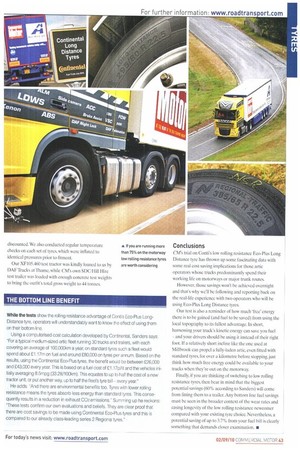THE BOTTOM LINE BENEFIT
Page 43

If you've noticed an error in this article please click here to report it so we can fix it.
While the tests show the rolling resistance advantage of Corals Eco-Plus LongDistance tyre, operators will understandably want to know the effect of using tern on their bottom line.
Using a computerised cost calculation developed by Continental, Sanders says: "For a typical medium-sized artic fleet running 30 trucks and trailers, with each covering an average of 100,000km a year, on standard tyres such a fleet would spend about £1.17m on fuel and around E80,000 on tyres per annum. Based on the results, using the Continental Eco-Plus tyres, the benefit would be between £26,000 and £43,000 every year This is based on a fuel cost of 21.17pilit and the vehicles initially averaging 8.5mpg (33.210100km). This equates to up to half the cost of a new tractor unit, or put another way, up to half the fleet's tyre bill — every year."
He adds: "And there are environmental benefits too. Tyres with lower rolling resistance means the tyres absorb less energy than standard tyres. This consequently results in a reduction in exhaust CO2 emissions." Summing up he reckons: "These tests confirm our own evaluations and beliefs. They are clear proof that there are cost savings to be made using Continental Eco-Plus tyres and this is compared to our already class-leading series 2 Regional tyres." •
























































































































































































































































